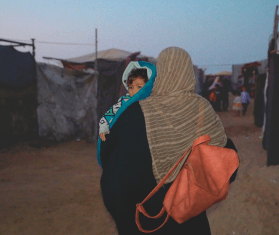Hundreds of thousands of ethnic Rohingya people are living in legal limbo after fleeing targeted violence in Rakhine state, Myanmar. Denied rights in both Myanmar and the countries to which they’ve fled, many are wholly reliant on humanitarian aid. Here, Doctors Without Borders/Médecins Sans Frontières (MSF) emergency coordinator Arunn Jegan describes his experiences working in the massive refugee camps for displaced Rohingya people in Bangladesh.
I first came to Cox’s Bazar in June 2017, at a time when thousands of Rohingya were already in Bangladesh from previous waves of targeted violence. Even then, the needs were massive. I returned as project coordinator that August, as hundreds of thousands more people arrived. It was obvious the Rohingya were fleeing violence—in one two-week period between August and September 2017, we watched pillars of smoke, most likely from houses and villages being burned, at several points across the border. At the border crossings, we saw Rohingya arriving with burns, gunshots, lacerations, and smoke asphyxiation. The trauma was visible on people’s faces and bodies.
They settled in camps that were already well below basic living standards, and where there had been very few aid actors working previously. One of the most striking things was the lack of dignity with which so many people were treated. Conditions were terrible, and they were ordered around by many different people and organizations. They did not seem to have much say in what happened to them.
Two years on, there are now better roads and more latrines and clean water points in and around the camps. There is more sense of order. But conditions in the camps remain precarious and big questions about people’s futures are still unanswered.
“I’m still trying to prove my identity as a human”
One of the most revealing conversations I’ve had was with a Rohingya family I first met two years ago. The father recently told me: “Many nongovernmental organizations are looking at this crisis from the perspective of the last two years, but I’m looking at it from the past 40 years—my whole life. I’m still trying to prove my identity as a human and that causes me immense pain and suffering.”
This status quo is not something we should accept.
There is no legal way for the Rohingya to work in Bangladesh, which contributes to massive social, economic, and financial pressure. Education provides a road map for any community to sustain and advance themselves, but Rohingya children aren’t allowed formal schooling. Access to specialized care is another big issue—there are health care services available, but with limited freedom of movement, the level of care required is often out of reach. Mental health remains stigmatized within the Rohingya community, as in much of the world.

Amid all the uncertainty, one thing is clear: This is not the time for the humanitarian response to scale down. Over 912,000 Rohingya are now in Bangladesh. We need to be talking about what we are doing for this population’s future, in both Myanmar and countries hosting the Rohingya. And yet short-term thinking continues for a long-term problem. The population is highly dependent on aid and we need to ask how long that can last. If we are looking for sustainable solutions, then the Rohingya need a roadmap for the future that includes access to things like jobs and education.
“History has repeated itself”
When I think of the future for the Rohingya, my biggest hope is that they are able to return home safely. Until then, I hope they are afforded greater self-sufficiency, education rights, as well as the legal recognition they deserve. If these things don’t happen now, I fear the Rohingya will be in the same situation in another two years, only with even fewer services available to them. Any decrease in aid should only come in tandem with growing self-sufficiency.
History has repeated itself with the Rohingya and they remain forgotten. If this happened in Australia, where I’m from, the world would pay attention. We have an opportunity to do better by them. The Government of Bangladesh has been accommodating but it’s not their burden to carry alone. This is a regional issue affecting all of Myanmar’s neighbors, as well as an international one. We have to step up and ensure that the Rohingya aren’t just getting food and water, but a future too.





